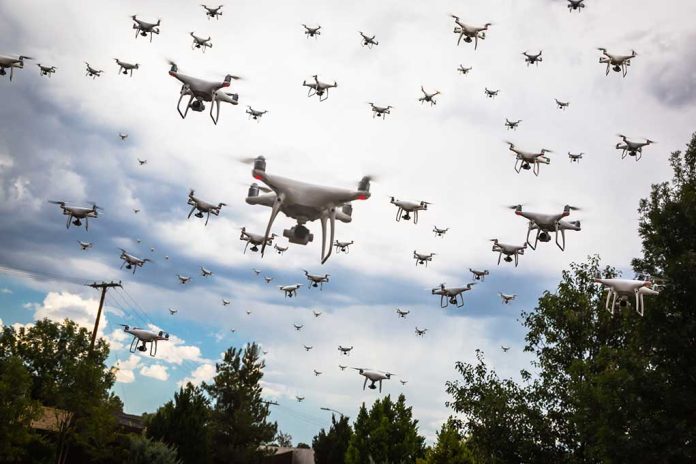
A proposed ban on Chinese drones by U.S. Congress could significantly impact industries dependent on DJI and other manufacturers amid national security concerns.
At a Glance
- The proposed ban targets DJI drones under the Countering the CCP Drones Act.
- DJI holds an estimated 70%-90% market share in the U.S. drone industry.
- A potential ban could disrupt sectors like real estate and public safety.
- Concerns exist about Chinese drones transmitting data to the CCP.
Targeting Chinese Drones
U.S. Congress is considering a ban on Chinese drones like those made by DJI and Autel Robotics as part of a broader military-focused bill. The move seeks to safeguard national security amid fears of espionage and data privacy infringements. This proposal aligns with ongoing efforts to minimize risks related to foreign technology in critical areas.
The proposed ban reflects growing scrutiny of technology from nations perceived as geopolitical competitors. The risks associated with imported tech have prompted legislative action to mitigate threats to American security. Amidst this backdrop, industries utilizing drones for essential functions face potentially severe operational challenges.
Chinese drones, like those from DJI, pose serious risks to our national security and critical infrastructure.
We must prioritize a strong cyber defense to protect America from foreign surveillance threats.https://t.co/qEplgIjSXA
— Congressman Morgan Luttrell (@RepLuttrell) December 3, 2024
Economic and Industrial Implications
The potential ban could disrupt operations across various sectors. DJI, the target of the proposed ban, commands between 70% and 90% of the U.S. drone market. The disruption could hinder businesses relying on drones for real estate, public safety, and aerial photography, industries where DJI has become invaluable.
The absence of cost-effective DJI alternatives could lead to operational delays, increased expenses, and economic strain on affected industries. The resulting market fragmentation might lower product standards across the board. Proponents argue for a more nuanced regulatory approach to balance national security and economic vitality.
🚨#ChinaWeek Update: @RepStefanik 's H.R. 2864, the Countering CCP Drones Act passes the House!
Chairman @RepMoolenaar in support of the bill ⬇️
"This bill would add Chinese drone company @DJIGlobal to the @FCC Covered List, meaning that any future models of DJI drones would… pic.twitter.com/qQIX9S0A7p
— Select Committee on the Chinese Communist Party (@committeeonccp) September 9, 2024
National Security and Legislative Concerns
The proposed legislation, part of the upcoming 2025 NDAA, aims to address security concerns by preventing companies like DJI from selling new drones in the U.S. Concerns persist that DJI drones may transmit sensitive data back to China, inviting increased governmental scrutiny and potential legislative action.
The investigation into Anzu Robotics, which partners with DJI, underscores the complexity of enforcing bans on Chinese technological entities. Anzu’s dealings with DJI reveal potential loopholes and highlight the intricacy of securing national interests against technology threats.
The ramifications of a ban extend beyond economic concerns, potentially straining U.S.-China relations and risking retaliatory measures. The discourse surrounding this legislation reflects broader challenges in safeguarding national security while maintaining international economic and diplomatic ties.
Sources:
- https://www.realclearpolicy.com/articles/2024/09/18/congresss_drone_ban_threatens_american_business_with_unintended_consequences_1059362.html
- https://www.newsmax.com/newsfront/china-drone-ban/2024/12/09/id/1190971
- https://freebeacon.com/national-security/this-chinese-drone-company-found-a-workaround-to-congresss-ban-on-doing-business-in-the-us-before-the-ban-is-even-passed/
- https://www.reuters.com/technology/dji-could-be-banned-launching-new-products-us-under-proposed-bill-2024-12-09/










